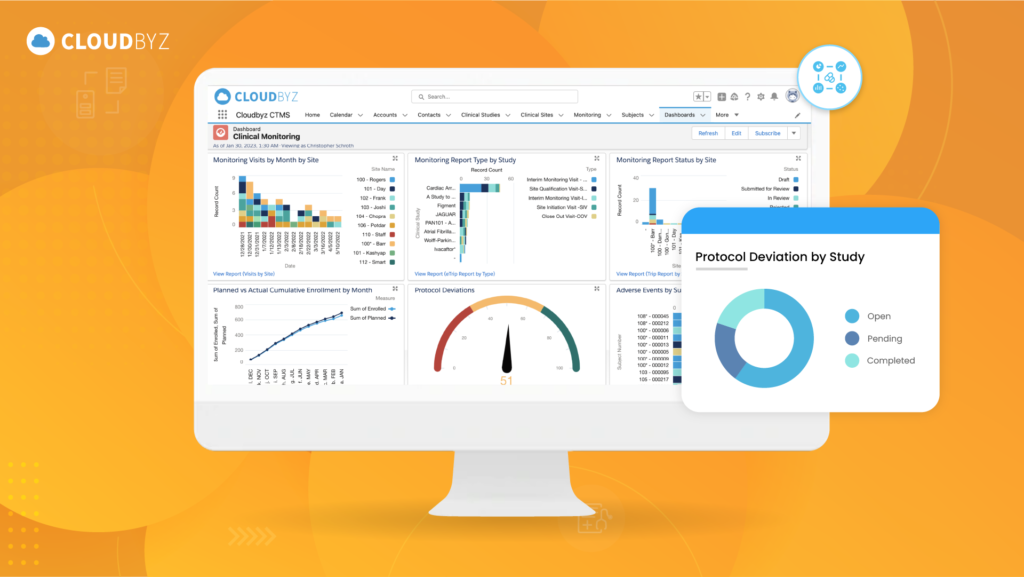
The clinical research industry is in the midst of a digital revolution, with Clinical Trial Management Software (CTMS) at the forefront of this transformation. Over the years, CTMS has evolved from basic, on-premises legacy systems to sophisticated, cloud-based platforms that offer unprecedented capabilities in managing clinical trials. This evolution is driven by the need for greater efficiency, real-time data access, scalability, and cost-effectiveness in an increasingly complex and globalized research environment. In this article, we will explore the journey from traditional CTMS to modern cloud-based solutions and examine the benefits that this shift brings to the industry.
The Early Days: Legacy CTMS Systems
In the early days of clinical research, managing trials was a manual, paper-based process. The introduction of legacy CTMS systems in the 1990s marked a significant improvement, offering digital tools to manage various aspects of clinical trials, such as study planning, patient enrollment, and site management. These systems, typically installed on-premises, were a step forward in streamlining trial operations and improving data organization.
However, legacy CTMS systems had their limitations:
- Limited Scalability:
- Legacy systems were often rigid and difficult to scale. As the number of trials increased, or as trials expanded geographically, these systems struggled to keep up with the growing demands. Adding new users or sites often required significant IT resources and time, limiting the system’s ability to adapt quickly to changing needs.
- Siloed Data and Lack of Integration:
- Legacy CTMS systems typically operated in silos, with little to no integration with other eClinical tools such as Electronic Data Capture (EDC) systems or Electronic Trial Master Files (eTMF). This lack of integration resulted in fragmented data, making it challenging to get a comprehensive view of trial progress or to ensure data consistency across different platforms.
- High Maintenance Costs:
- On-premises systems required substantial investment in hardware, software, and IT support. Organizations had to bear the costs of maintaining and upgrading these systems, which often involved downtime and disruptions to trial operations. The total cost of ownership was high, particularly for smaller organizations with limited IT budgets.
- Limited Accessibility:
- Access to legacy CTMS systems was often restricted to specific locations or devices. This limited the ability of remote teams or global sites to access and update trial information in real-time, leading to delays and inefficiencies in trial management.
- Complex User Interfaces:
- Many legacy systems had cumbersome and outdated user interfaces that were not user-friendly. This complexity made it difficult for trial managers and site staff to navigate the system efficiently, leading to potential errors and reduced productivity.
The Shift to Cloud-Based CTMS
The advent of cloud computing in the early 2000s heralded a new era for CTMS. Cloud-based CTMS solutions offered a flexible, scalable, and cost-effective alternative to traditional on-premises systems. The shift to cloud-based platforms has been driven by several factors:
- Scalability and Flexibility:
- Cloud-based CTMS platforms are inherently scalable, allowing organizations to easily expand their operations as needed. Whether adding new users, sites, or trials, cloud solutions can be adjusted quickly and with minimal effort. This scalability is particularly valuable for organizations conducting large, multi-center trials or managing a portfolio of studies with varying requirements.
- Real-Time Data Access and Collaboration:
- One of the most significant advantages of cloud-based CTMS is the ability to access data in real-time from anywhere in the world. This capability is crucial in today’s globalized research environment, where trials often span multiple countries and time zones. Cloud-based platforms enable seamless collaboration among stakeholders, including sponsors, CROs, site staff, and regulatory bodies, ensuring that everyone has access to the most up-to-date information at all times.
- Integration with eClinical Ecosystem:
- Modern cloud-based CTMS solutions are designed to integrate with other eClinical tools, such as EDC, eTMF, and Laboratory Information Management Systems (LIMS). This integration enables a unified data flow across the entire clinical trial process, from data capture to regulatory submission. The result is improved data accuracy, reduced redundancy, and a comprehensive view of trial progress.
- Cost-Effectiveness:
- Cloud-based CTMS platforms operate on a subscription model, eliminating the need for large upfront investments in hardware and software. Organizations pay only for the resources they use, making it easier to manage costs and budget for trial expenses. Additionally, cloud solutions reduce the need for in-house IT support, as maintenance, updates, and security are managed by the cloud provider.
- Enhanced Security and Compliance:
- Security is a critical concern in clinical trials, given the sensitive nature of patient data. Cloud-based CTMS platforms offer advanced security features, including encryption, multi-factor authentication, and regular security updates. These platforms are also designed to comply with industry regulations such as GDPR, HIPAA, and 21 CFR Part 11, ensuring that trial data is protected and that organizations meet their regulatory obligations.
- User-Friendly Interfaces:
- Modern cloud-based CTMS platforms prioritize user experience, offering intuitive, user-friendly interfaces that are easy to navigate. This simplicity reduces the learning curve for trial managers and site staff, improving efficiency and reducing the likelihood of errors.
The Benefits of Cloud-Based CTMS
The shift to cloud-based CTMS has brought numerous benefits to the clinical research industry, transforming how trials are conducted and managed:
- Improved Efficiency:
- By automating routine tasks and streamlining workflows, cloud-based CTMS platforms significantly improve operational efficiency. Trial managers can focus on higher-value activities, such as patient recruitment and data analysis, rather than being bogged down by administrative tasks.
- Faster Study Start-Up:
- Cloud-based platforms enable faster study start-up by simplifying the process of setting up new trials, sites, and users. With real-time data access and collaboration tools, sponsors can quickly onboard sites, train staff, and begin enrolling patients.
- Enhanced Data Quality and Integrity:
- Integration with other eClinical tools ensures that data is captured, stored, and managed consistently across the trial lifecycle. This consistency reduces the risk of data discrepancies and enhances the overall quality and integrity of trial data.
- Global Accessibility:
- Cloud-based CTMS platforms support global trials by providing secure, real-time access to data from any location. This accessibility is crucial for managing trials that involve multiple sites across different regions, ensuring that all stakeholders are aligned and informed.
- Proactive Risk Management:
- Real-time data access and advanced analytics enable proactive risk management. Sponsors can monitor trial progress, identify potential issues, and take corrective action before problems escalate. This proactive approach reduces the risk of delays and helps ensure that trials stay on track.
- Greater Patient Engagement:
- Cloud-based CTMS platforms support patient-centric approaches by enabling remote monitoring, telemedicine visits, and direct-to-patient communication. These capabilities improve patient engagement and retention, leading to better trial outcomes.
The Future of CTMS: Beyond the Cloud
As cloud-based CTMS continues to evolve, the future promises even greater advancements in clinical trial management. Emerging technologies such as artificial intelligence (AI), machine learning (ML), and blockchain are expected to further enhance the capabilities of CTMS platforms, enabling predictive analytics, personalized patient experiences, and secure, transparent data sharing.
AI and ML, for example, can be used to analyze vast amounts of trial data, identifying patterns and trends that can inform decision-making and improve trial outcomes. Blockchain technology offers the potential for secure, decentralized data management, ensuring data integrity and transparency across the trial lifecycle.
Moreover, the trend towards decentralized trials (DCTs) will continue to shape the evolution of CTMS. As trials move away from traditional site-based models to more flexible, patient-centric approaches, CTMS platforms will need to support remote monitoring, telemedicine, and direct-to-patient interactions. Cloud-based solutions are well-positioned to adapt to these changes, offering the scalability, flexibility, and real-time data access needed to manage decentralized trials effectively.
Conclusion
The evolution of Clinical Trial Management Software from legacy systems to cloud-based platforms represents a significant leap forward in the clinical research industry. Cloud-based CTMS solutions offer unparalleled scalability, real-time data access, cost-effectiveness, and integration capabilities, transforming how clinical trials are conducted and managed.
As the industry continues to embrace digital transformation, cloud-based CTMS will play a pivotal role in driving innovation, improving trial efficiency, and ultimately bringing new therapies to market faster. For organizations looking to stay competitive in this rapidly changing landscape, investing in a modern, cloud-based CTMS is not just an option—it’s a strategic imperative.
The future of CTMS is bright, with emerging technologies and patient-centric approaches set to further enhance the capabilities of these platforms. By staying at the forefront of these developments, organizations can ensure that they are well-equipped to navigate the complexities of clinical trials and deliver successful outcomes in the years to come.


